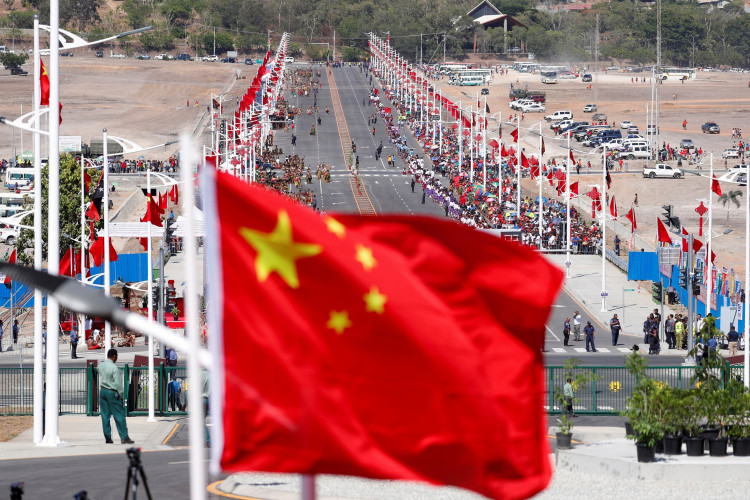China reaffirmed its confidence in meeting its economic growth targets this year but stopped short of introducing the large-scale fiscal stimulus that many investors had anticipated. The announcement, made by the National Development and Reform Commission (NDRC) on Tuesday, comes as the world's second-largest economy faces mounting pressures from a property market slump, weak consumer spending, and global trade tensions.
During the briefing, Zheng Shanjie, chairman of the NDRC, emphasized the government's belief that it would achieve its economic and social development goals for 2024 despite a challenging environment. "We are fully confident in achieving the annual economic and social development targets," Zheng said, acknowledging the complexities both domestically and internationally that China must navigate to maintain stability.
China's benchmark CSI 300 Index surged nearly 11% at the open following the National Day holiday, but gains quickly dissipated, closing up 5.9% as optimism faded. Meanwhile, Hong Kong's Hang Seng Index experienced its worst decline since 2008, plummeting by more than 10%. The rapid shift in market sentiment was driven by the absence of significant new stimulus measures, which had been expected to propel economic growth.
Investors were left underwhelmed as the NDRC's statements largely reiterated existing plans rather than introducing fresh initiatives to stimulate the economy. "Nothing much is new compared to the previous announcements, and the latest commitment to fiscal stimulus looks weaker than market expectations," noted Gary Ng, senior economist at Natixis SA. "The front-loading of fiscal spending will only help stabilize growth and will not be enough to engineer a sharper rebound."
The NDRC outlined its intention to accelerate fiscal spending by bringing forward 100 billion yuan ($14 billion) in central government investment initially planned for 2025 and adding another 100 billion yuan for key strategic areas in 2024. However, the scale of this support fell short of what many market watchers had hoped for, given China's pressing need to counteract a slowdown exacerbated by the property sector's troubles and global uncertainties.
Ahead of the briefing, financial institutions such as Morgan Stanley and Citigroup had predicted that the NDRC might announce a stimulus package ranging between 2 trillion and 3 trillion yuan. This was expected to focus on infrastructure investments, local government financing, and consumption support. Instead, the measures revealed were more moderate, dampening expectations of a swift economic turnaround.
Zheng Shanjie also discussed plans to introduce specific measures to expand funding support from special local government bonds, aiming to support public services, inter-city transportation, and urban infrastructure upgrades. He stressed the importance of these investments, noting that China requires significant improvements to its water supply, drainage systems, and gas and heating networks, estimating a need for nearly 600,000 kilometers of infrastructure over the next five years at a cost of around 4 trillion yuan.
Despite the restrained fiscal approach, the NDRC's Liu Sushe said that the majority of this year's 6 trillion yuan in government investment had already been allocated to specific projects, with 90% of local government bonds issued for construction projects by September. The focus now is on utilizing these funds effectively to support sectors crucial for sustaining economic momentum.
The relatively cautious approach taken by the Chinese government reflects broader concerns over the country's economic trajectory. Recent data have shown sluggish consumer demand, a persisting property market downturn, and rising global trade tensions, all of which threaten to undermine the country's growth prospects. Analysts from the Economist Intelligence Unit have projected China's growth at 4.7% this year, falling just short of the government's target of around 5%.
Bruce Pang, chief economist for Greater China at Jones Lang LaSalle Inc., highlighted the critical need for sustained fiscal support to drive further economic growth. "If and only if sizable and sustained fiscal support is in the front seat can China's economy further gain momentum," Pang said, emphasizing the importance of robust policy measures to uplift the country's slowing economy.
Premier Li Qiang echoed this sentiment in a separate session, urging all government departments to step up support for economic growth and to enhance policy coordination. The premier hinted at additional policies under consideration that could provide reserve support for next year, but specifics remained vague, leading to continued uncertainty among investors.
The absence of bold new initiatives underscores a broader debate about the effectiveness of Beijing's economic strategy. Analysts like Christopher Wong, a currency strategist at OCBC, have noted the lack of detail in the latest announcements as a significant letdown. "Hopes were raised, but the delivery was disappointing," Wong said, reflecting a common sentiment that more aggressive fiscal policies are necessary to sustain investor confidence.






